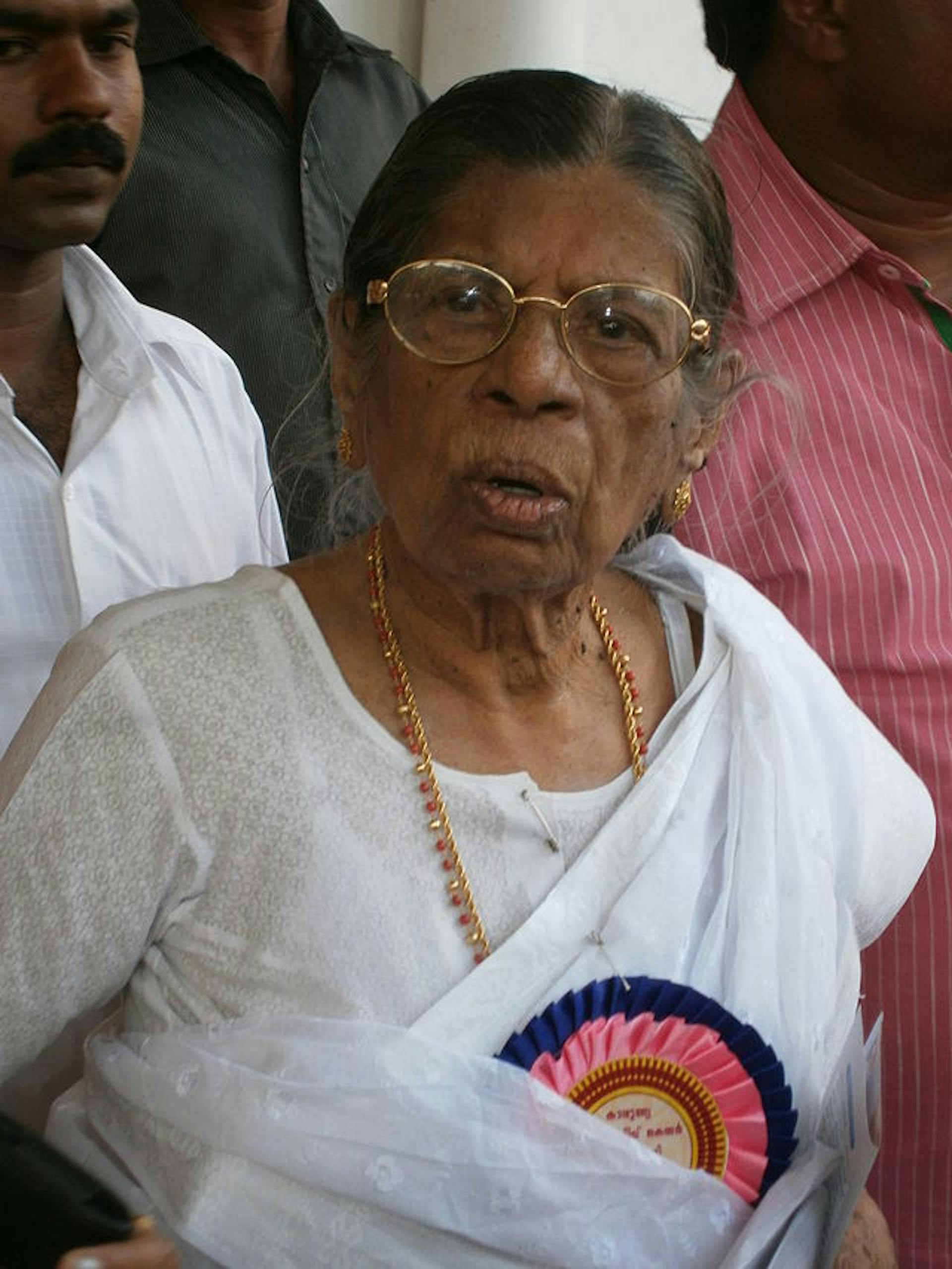But that happy development was an aberration. A subsequent stint in detention turned out to be a nightmare. This time, she recounted in a 2009 interview with the television channel Asianet, “I was brutally beaten. They ripped off my clothes, and I was kicked and tortured.”
Gouri began to fast in protest, and was soon moved to a medical college, and force-fed through a tube. “There was a clamp on my teeth which was screwed to make me open my mouth.” She pointed to one of her teeth and told the interviewer, “That was how this tooth broke.” For 17 days, she alleged, the police force-fed her milk. By then, her health deteriorated and she was moved to a hospital for further treatment. In interviews, Gouri has often said, “If lathis could reproduce, I would have borne many lathi babies.”
The story of how she endured police brutality sealed her place in Kerala politics forever. “She acquired the kind of power that someone who had undergone personal suffering has,” academic Sanal Mohan told me.
“It steeled her and made her capable of asserting herself.”
In July 1949, the princely states of Travancore and Cochin were merged. The CPI was still a banned organisation, with many of its leaders in prison. Many communists contested a 1951 provincial election as independents. One of these was Gouri, who contested and won from prison. It was the beginning of a string of electoral victories. In 1954, after the ban on the CPI was lifted, she contested and won again, in an election that even the mighty EMS lost.
That was the last election before the formation of Kerala state. It was also the last time the Congress’s dominance could be taken for granted in Kerala. By the time the next election was held, in 1957, Kerala had been born under the aegis of India’s States Reorganisation Act, and the CPI won a majority, gaining 60 of 126 seats and securing the support of five independents.
EMS was sworn in as the new state’s first chief minister, and Gouri was appointed revenue minister. Babu Rajendran, who married Gouri’s niece Ayshabai and also worked as her private secretary for much of her career, told me that her ministerial salary was ₹600 around this time. “From that the party took ₹250,” he said. Though her living and travel expenses were met by the government, he said she had to take money from her family’s agricultural income to meet the expenses of running her office.
Kerala today is frequently held up as a relatively successful model of governance with high literacy, high life expectancy, low infant and maternal mortality, and relatively low poverty. Much of the foundation of that progress was laid during this time, carrying forward the promise of popular cultural and religious movements. Among other measures, the first EMS government overhauled the education system, introduced a more organised and responsive police force and increased the minimum wage in the state. These reforms hold a prominent place in what is today called the “Kerala model.”
More radical and urgent than all these were land reforms. On 11 April 1957, six days after it came to power, the government promulgated an ordinance prohibiting the eviction of tenants from their land. This stripped landlords of some of the power they wielded over farm labourers. Eight months later, on 21 December 1957, the government introduced the Agrarian Relations Bill in the assembly, heralding a new era of land rights in Kerala. Gouri
tabled that bill in the assembly. “This bill will bring to fruition one of the fundamental rights guaranteed by the national movement,” she announced to the assembly, “that every farmer will be given ownership of his land, within the provisions of the Indian constitution.”
This was indeed the promise of the Congress-led freedom movement: that, having uprooted the British, a democratic government would also overturn the ossified misrule of upper caste landlords over millions of impoverished landless labourers. But land reform struggled elsewhere in the country, hamstrung by the Congress’s own conservative landed leaders.
In Kerala, the communist government fixed a ceiling for how much land an individual or family could hold: no more than 15 acres for a five-member family. The excess would be distributed among the landless. By the time the bill was passed in June 1959, it had been discussed for a total of 124 hours over 18 months in the assembly, and a total of 1296 amendments had been considered.
The legislation was viciously attacked by the opposition and the leading newspapers of the day. Two days after the bill was passed, the Congress party and its supporters launched one of the ugliest protests in the history of Kerala, called Vimochanasamaram, or the ‘liberation struggle.’ Notoriously, its slogans were full of caste slurs.
An infamous one went: “Don’t let Gouri Chovvathi rule, let her go spin coir!” using a word meant to insult her Ezhava background. (Kerala remains far from free of this kind of casteism in public life. The current chief minister, Pinarayi Vijayan, comes from a caste traditionally occupied as toddy tappers. In December 2018, the Bharatiya Janata Party’s mouthpiece Janmabhoomi, opposing the government’s actions to open up the Sabarimala temple to female devotees, published a cartoon captioned: “This is what will happen if power is given to those who should climb coconut trees.”) Other slogans included “Rowdy Thomma”—short for Thomas—“where are the jobs?” and “What’s in Mundassery’s dumb head? Coir dust or toddy?”
The Congress, ruling in Delhi, was shaken by the reforms. The extent of their disquiet became clear in July of 1959, when President Rajendra Prasad dismissed the EMS government on Prime Minister Jawaharlal Nehru’s recommendation. With this move, Nehru set a precedent of blatant constitutional misuse, one that other prime ministers would misuse scores of times in the decades to come. In Kerala, it was clear where the people’s sympathies lay. The communists got more votes in the next election in 1960, than it did in 1957.

